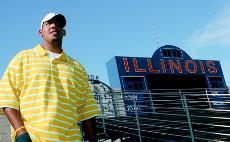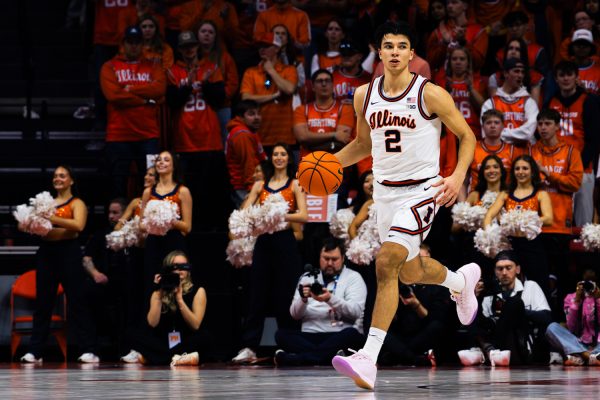Draft day dreams

Former Illinois football player Duke Preston, watches practice at Memorial Stadium on Friday. Preston made it into the NFL last year and is playing for the Buffalo Bills as an offensive lineman. Adam Babcock
Apr 27, 2006
Steve Weatherford isn’t used to being nervous. Having spent high school and college as one of the best athletes around, Weatherford is normally confident and a little cocky. He’s as comfortable punting a football as most people are tying their shoes.
But with the NFL draft days away, Weatherford is within hours of the life-changing moment that might put him among the nation’s elite athletes. By Sunday he could be on his way to a big contract for big money with a big-time pro team – or he could be forced to face life after football. The array of possibilities means Weatherford has become accustomed to a previously unfamiliar emotion: anxiety.
“I don’t like this feeling at all,” Weatherford says. “I can’t control anything.”
For Weatherford and fellow Illini James Cooper, Jason Davis, Kendrick Jones, Ryan Matha, Morris Virgil and Travis Williams, Saturday’s draft symbolizes the culmination of six months of intense training, four seasons of perseverance and a lifetime of dreaming. It could be a ticket to the proverbial fame and fortune of life in the NFL, or it might mark the end of their athletic careers.
“This is the type of thing I know I can do, I know I can make happen,” Virgil says.
Get The Daily Illini in your inbox!
Every kid’s dream
Clutching a stack of orange and blue sweatshirts, a man rummages through a rack of old uniforms during last Saturday’s Stadium Sale. He pauses to remove a white jersey from the group as the name catches his eye.
“Look son, here’s a Morris Virgil jersey,” he says, pulling the long white shirt from the rack and examining the name and bold number 20 on the back. “Let’s buy it; this is the last one.”
Virgil is an Urbana native who’s made a name for himself on both sides of the football, but by next week he hopes that jersey will be worth its $30 price tag. After two seasons on defense and a career that spans one of the most winless periods in Illinois history, Virgil knows it won’t be easy to make it in the NFL. But that isn’t stopping him.
“This is one thing I never want to go back on and say, ‘I wish I would have tried it, I wish I would have done it,'” Virgil says.
For most football junkies, NFL careers are things to dream about while playing catch. But when you become an All-American punter like Weatherford, the agents start calling and talk of the big time begins to filter into conversations.
“Watching games on Sundays, I started to think those guys aren’t that good,” Weatherford says. “I thought I could do that.”
Former Illini center Duke Preston, who just finished his rookie season with the Buffalo Bills, says he never believed he could go pro. Preston’s father played nine years for the San Diego Chargers and college recruiters assured him he could follow in his dad’s footsteps, but professional football still seemed like an unreachable dream.
“When I first got here, the guy who recruited me said, ‘You’re going to be a great player on Saturdays and you’ve got a chance to be a great player on Sundays,” Preston says.
Virgil says he knows there’s a chance a pro career might not pan out. More than 10,000 athletes play Division-IA college football, but only 1,696 players are in the NFL. But ever since Virgil realized he might be able to do it, he’s known he had to try.
“I think I’ve got the opportunity to go out, play football, and do the type of things to help a team win games,” Virgil says. “I love football, I love to play the game, so I’m just going to go out there, take a shot, see where I’m at. I think I can do it.”
The road to the top
Weatherford steps into the players lounge at Memorial Stadium with his shoes in one hand and a canvas bag full of footballs slung over his shoulder. It has been five months since his last college game and four since he earned his diploma, but the punter is still at the Stadium every day, lifting weights, running sprints and working on his technique.
But while Weatherford spends his days at the Stadium, other guys have taken different routes.
Fullback Jason Davis balances workouts with classwork. As a fourth-year senior taking 15 hours, he is still finishing the last requirements for his Sports Management degree.
“When you are trying to balance two lifetime goals, it’s hard,” Davis said. “But I get through it by telling myself there’s light at the end of the tunnel and how proud I’ll be to be the first college graduate in my family and at the same time fulfill my ultimate goal, which is playing in the NFL.”
Virgil, a safety, fled campus altogether. His agent recommended moving to Texas, where Virgil spent more than two months doing two-a-day workouts, lifting and even taking yoga classes to prepare for pro timing day. Virgil says he knows there’s a difference between college and pro football, and he wanted to prove he could make the transition.
Illinois head coach Ron Zook, who coached in the NFL for six years, says being driven in your training is vital to pro success.
“You have to be a self-starter, self-motivator,” Zook said. “If you don’t do it they’re just going to bring somebody else in to take your spot.”
Weatherford says even the smallest details can have a big effect on what round players are picked. He says three years of college track and even playing four sports in high school give him an advantageous athleticism. Punters aren’t expected to run the 40-yard dash in 4.4 seconds, he said, but scouts tell him it’s a nice resume booster.
Preston says the little things add up when going into the draft. There isn’t much difference in the quality of player picked in the second round versus the fourth or fifth, but there is in the size of the paycheck – so while teams will wait if they think players will be available in later rounds, it’s important to the athletes that they are chosen as early as possible.
“In the draft the name of the game is a sense of urgency,” Preston says. “At any position, if a team thinks they can pass on a guy and then pick him up later, then they’re going to pass. That’s the business side of it.”
Making it
Virgil has only been an Illini alum for a few months, but he blends in with former players back for the spring scrimmage. He works his way around the stadium chatting with staff and former teammates, telling everybody to watch him on “Cold Pizza” and happily pausing for TV interviews. He wears a white tank top with matching baseball hat and flashes his easy-going grin as he laughs off jokes that he’s trying to look the part of an NFL player.
“Now I’m doing interviews and stuff like that,” Virgil says of the last step before the big day. “I’m trying to get my name out there and waiting to hear my name called.”
Current NFL player Preston lounges in the shade on the other side of the stadium, watching practice and saying hello to friends he hasn’t seen since leaving campus. Preston made the big time; he’s got a six-figure salary and could start for the Bills next fall.
The San Diego native says he avoids viewing football as a job, saying “free agent moves, the draft, money this and contract that, that stuff can drive you crazy.” He says he remembers feeling as stressed as Weatherford is now, and training as hard as he sees this year’s crop of rookies working.
Things don’t get easier, he promises, because each season someone new is fighting for your spot on the depth chart and the paycheck that comes with it. The seven Illini hoping to join Preston in the NFL know that, but as Weatherford points out, that’s the price of a career in professional sports.
“Five, 10 years down the road, that will be my kids’ food I’m earning,” Weatherford says. “It’s going to be a little bit less stress, but it’s your job. You’ve got to do well to get paid.”





